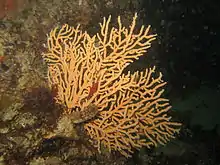Eunicella verrucosa
Eunicella verrucosa, the broad sea fan, pink sea fan or warty gorgonian, is a species of colonial Gorgonian "soft coral" in the family Gorgoniidae. It is native to the north-eastern Atlantic Ocean and the western Mediterranean Sea.
| Broad sea fan | |
|---|---|
 | |
| Scientific classification | |
| Domain: | Eukaryota |
| Kingdom: | Animalia |
| Phylum: | Cnidaria |
| Class: | Octocorallia |
| Order: | Alcyonacea |
| Family: | Gorgoniidae |
| Genus: | Eunicella |
| Species: | E. verrucosa |
| Binomial name | |
| Eunicella verrucosa | |
Description
Eunicella verrucosa has a densely branching, fan-like stem and usually grows in a single plane. It orientates itself at right angles to the direction of water movement and can grow to a height of 50 cm (20 in), although 25 cm (10 in) is a more usual size. Stems and branches are covered with wart-like growths from which the polyps protrude. The colour can vary from red, through pink to white.[3]
Distribution
Eunicella verrucosa is native to the northeastern Atlantic and the western Mediterranean Sea.[2] Its range extends from the southwestern coasts of Britain and Ireland to France, Spain, Italy, Algeria, Morocco, Western Sahara and Mauritania.[1] A recent study of genetic connectivity in Eunicella verrucosa identified marked population structure between samples from northwest Ireland, Britain, France and southern Portugal.[4] It is found growing on rock, timber, metal or concrete and its depth range is 4 to 50 metres (13 to 164 ft).[5] In British waters this sea fan has become scarcer, possibly being damaged by dredging but may benefit from higher seawater temperatures.[6]
Biology
Eunicella verrucosa is usually orientated at right angles to the direction of water flow across the colony. The polyps expand and spread out their tentacles to feed. The nutrients are passed to other parts of the colony through the internal channels connecting the polyps.[7]
Reproduction in Eunicella verrucosa has been little studied. The planula larvae are likely to be lecithotrophic (sustained by a yolk-sac) and able to drift for a short time before settling on the seabed where they develop into polyps and found new colonies. The growth rate of colonies varies; in Lyme Bay in southern Britain, some colonies grew by 6 cm (2 in) in one year while in another year, did not grow at all.[8] The sea fan anemone (Amphianthus dohrnii) is often found living on Eunicella verrucosa.[9]
References
- World Conservation Monitoring Centre (1996). "Eunicella verrucosa". IUCN Red List of Threatened Species. 1996: e.T8262A12903486. doi:10.2305/IUCN.UK.1996.RLTS.T8262A12903486.en. Retrieved 15 November 2021.
- Eunicella verrucosa (Pallas, 1766). Retrieved through: World Register of Marine Species.
- Hiscock, Keith (2007). "Pink sea fan - Eunicella verrucosa - General information". MarLIN. Archived from the original on 2014-12-13. Retrieved 2014-12-14.
- Holland, L. P.; Jenkins, T. L.; Stevens, J. R. (2017). "Contrasting patterns of population structure and gene flow facilitate exploration of connectivity in two widely distributed temperate octocorals". Heredity. 119 (1): 35–48. doi:10.1038/hdy.2017.14. PMC 5520136. PMID 28295035.
- Hiscock, Keith (2007). "Pink sea fan - Eunicella verrucosa - Habitat preferences and distribution". MarLIN. Archived from the original on 2014-12-14. Retrieved 2014-12-14.
- Hiscock, Keith; Southward, Alan; Tittley, Ian; Hawkins, Stephen (2004). "Effects of changing temperature on benthic marine life in Britain and Ireland". Aquatic Conservation. 14 (4): 333–362. doi:10.1002/aqc.628.
- Dumas, Jacques; Maran, Vincent; Ader, Denis; Huet, Sylvie (2014-04-30). "Eunicella verrucosa (Pallas, 1766)". DORIS (in French). Retrieved 2014-12-18.
- Hiscock, Keith (2007). "Pink sea fan - Eunicella verrucosa - Reproduction and longevity". MarLIN. Archived from the original on 2014-12-14. Retrieved 2014-12-14.
- "Sea-fan anemone Amphianthus dohrnii". ARKive. Archived from the original on 2014-12-17. Retrieved 2014-12-13.
External links
- Marine Life Encyclopaedia
- Image of a broad sea fan
- Pink sea fan conservation in the UK
- Photos of Eunicella verrucosa on Sealife Collection
